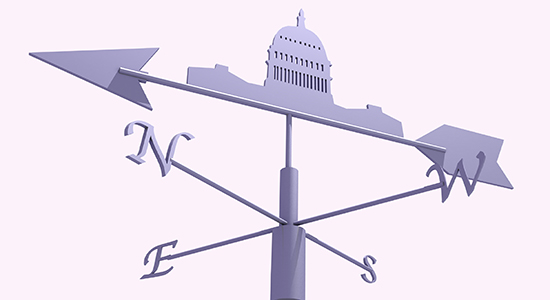Here’s What you May Have Missed
Not connecting with us online? This month we highlight readers’ comments posted to online articles. Let’s hear what you have to say. Post comments to WisBar News, InsideTrack, and Wisconsin Lawyer articles or respond to Facebook, LinkedIn, and Twitter posts. Or simply email the editors at wislawmag@wisbar.org.
Bill Dyke: His Expression of Art was a Gift to Us

The Wisconsin Lawyer™ special issue on Lawyers & the Arts (May 2016) included interviews with several creative lawyers with a variety of arts interests. Sadly missing in the cover feature was jurist-artist, and all- around Renaissance man, Iowa County Judge Bill Dyke, who had passed away just days after he agreed to be interviewed.
In response to the Inbox tribute the editors ran in that issue on Bill’s artwork, the Hon. Jean DiMotto had this to say:
“Thank you for the lovely article on Bill Dyke in the arts and lawyering issue of the Wisconsin Lawyer. He was an unusually talented person who used his gifts for the greater good. He was smart, kind, and generous. He and I became judges at the same time and he was a favorite of mine. Thanks for the tender tribute to this life well lived.”
Legal Research: Elder Abuse and Neglect Case Resources

On June 15, World Elder Abuse Awareness Day, that day’s issue of InsideTrack™ carried an article listing some resources and research guides for elder abuse and neglect cases specific to Wisconsin. Attorney Linda Krueger added to the list.
For information and resources on the correlations between animal abuse, child abuse and neglect, domestic violence, elder abuse, and other forms of violence, see nationallinkcoalition.org.
Readers are invited to share additional resources.
Changing the Rules on Rulemaking

In this Wisconsin Lawyer article (August 2011), attorney Ronald Sklansky wrote about the effects of 2011 Wisconsin Act 21. He said the act significantly changes how administrative rules are promulgated. Among other things, it narrows state agencies’ rulemaking authority, gives the governor new powers to approve or prevent the adoption of rules, expands the economic-impact-analysis requirement to all agencies, and expands venue in declaratory judgment actions to all counties.
In a testament to the applicability of that article today, a reader began a recent online conversation with the author, which we share below:
Reader: This is an excellent article. Am I correct in understanding that Act 21 applies only to new rule-making, and does not affect existing administrative rules?
Author: Thanks for your kind words. Act 21 primarily dealt with the promulgation of administrative rules when the promulgation process began on or after the effective date of the Act. However, three provisions of the statutes, as affected by the Act, can have an impact on properly promulgated rules, regardless when they became effective:
1) Wis. Stat. section 227.10(2m) – No agency may implement or enforce any standard, requirement, or threshold unless that standard, requirement, or threshold is explicitly required or explicitly permitted by statute or by a rule that has been promulgated in accordance with Wis. Stat. chapter 227. (These provisions conceivably could be used to challenge pre-Act 21 rules.)
2) Wis. Stat. section 227.11(2) – In general provides that (a) neither legislative statements of intent or declarations of policy nor statutory descriptions of powers and duties confer rule-making authority upon an agency and (b) an agency rule may not be more restrictive than a statute. (These provisions conceivably could be used to challenge pre-Act 21 rules.)
3) Wis. Stat. section 227.40(1) – Provides that venue to challenge the validity of an administrative rule lies in the county of the party’s residence or the party’s principal place of business. (The prior law placed venue for these proceedings in Dane County.)
Let me know if this response does not answer your question.
Reader: Thank you. My thinking is in the context of the somewhat controversial area of high capacity wells, which was the subject of a Wisconsin Attorney General opinion of May 10, 2016. The opinion does not address the retroactivity of Act 21 relative to previously issued high capacity well permits.
So, the question is whether the three sections you cite apply to DNR high capacity wells that were permitted prior to Act 21 and are subject to cumulative impact and monitoring conditions? It seems to me that a pre-Act 21 permit that was conditioned on monitoring and cumulative impact factors is unaffected by Act 21. See Gibson v. American Cyanamid, 760 F.3d 600 (7th Cir. 2014). This is especially where substantive interests of neighboring well users and water resource dependent interests are (or could be) protected by such pre-Act 21 permits.
The Attorney General opinion is that the DNR lacks authority to issue new permits conditioned on monitoring and cumulative impact considerations.
The question is whether Act 21 precludes the DNR from enforcing such pre-Act 21 permits? If so, it would mean that Act 21 negates some of the properly promulgated and legislatively ratified sections of the DNR Code, NR 812, retroactively.
My personal interest in this is as a trout fisherman who has seen trout streams dry up in the Central Sands region. I am not representing any person or organization regarding this question.
We Want to Hear from You! Submit a Letter to the Editor
Wisconsin Lawyer provides a forum for members to express ideas, concerns, and opinions on law-related subjects. Send comments to wislawyer@wisbar.org (include “Letters” in the subject line), or mail to Wisconsin Lawyer “Letters,” P.O. Box 7158, Madison, WI 53707-7158. Limit to 500 words. Writing guidelines available.
